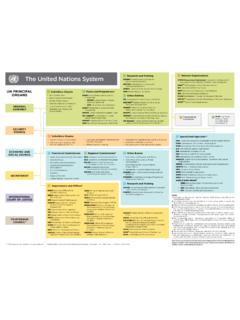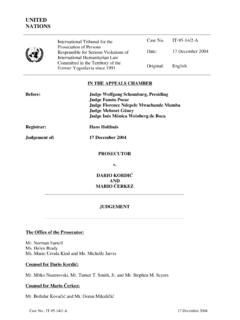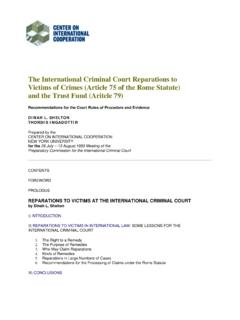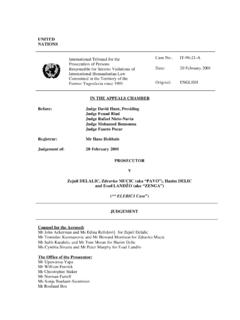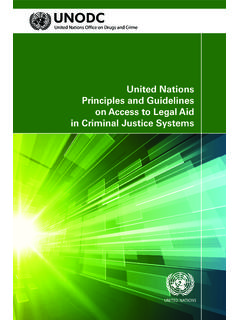Transcription of ERASMUS+ MOBILITY PROGRAMME MY …
1 Plymouth Law and criminal Justice Review (2018) 155 ERASMUS+ MOBILITY PROGRAMME MY INTERNSHIP WITH GERMAN LAW FIRM NZP NAGY LEGAL Julia Glukhikh Introduction Last summer I undertook an internship PROGRAMME with a law firm in Germany under Erasmus+ MOBILITY Scheme. This was a truly valuable and useful experience as I got a chance to observe how a different legal system operated practice and compare it with the English legal system. I gained a fair amount of practical knowledge of German law, obtained professional networking connections in several European countries and raised my personal self-esteem by accepting the challenge. I quickly found out that the second year of the LLB law degree was significantly more demanding than the first year with revision and coursework preparation taking most of my free time.
2 While heavily involved with the academic work, volunteering and Plymouth University Law Society competitions, I completely forgot about the deadlines for vacation scheme applications with law firms in the UK. On missing these deadlines, I started looking for other options such as paralegal roles, business internships and volunteering projects. The application process was daunting and I started to lose focus and with it any likely hope of success. As a student ambassador, I work part-time at Plymouth University s international Office. My supervising manager, Alana Hunter, who is a senior administrator, suggested that I investigate the Erasmus+ programmes. Erasmus+ is an international student exchange scheme that enables participants to study or undertake professional training for a period of between 2 and 12 months in another European country.
3 There is funding available for students to support them during their work or study abroad. The grant rates for students from UK universities are set by the British Council and the amount available depends on the cost of living in the destination country. Plymouth Law and criminal Justice Review (2018) 156 At first, I was reluctant to look at the offers available as I associated the Erasmus+ scheme with international university exchange for the purpose of study, not work-based experience. My other concern was that law is a very jurisdictional specific subject that may not be easily transferrable given many of the crucial differences between the legal systems of the UK, which are traditionally adversarial based, and the majority of European countries which are more inquisitorial.
4 This is why I thought it unlikely that there would be any suitable options available to do comparative legal work. Also going abroad for work normally implies that speaking a foreign language will be required. I had some knowledge of conversational French obtained at high school and covered with dust since then, which was not sufficient for professional use. Finally, I was worried about my eligibility as I was an international , non-EU student which usually means that most funding opportunities are not available to me. Securing an international Work Placement Alana suggested that I contact Plymouth Global, a department at the University that develops international partnership networks for current students and staff.
5 They were very approachable and friendly and explained that non-EU students studying at UK universities could take part in the Erasmus+ exchange PROGRAMME and receive funding on the same conditions as home students. The University provides support with completing the documents and authorising grant payments but first I had to find a suitable internship: one that was law related internship and in English. I started my search by registering an account on the Erasmus Intern website. The personal profile looks like a short CV where you can include your academic and professional experience as well as your interests and aspirations. Once the necessary sections are complete, your profile becomes visible to the companies hiring based on the preferences that you have set country and/or industry.
6 You may wait for the offers or invitations to apply to come from the companies or alternatively you can be proactive and do the search yourself and apply directly for the available positions. Due to the specific requirements that I had, there was a limited choice of options, however, I managed to apply to three firms in Germany, Spain and Belgium. Shortly after that I received an invitation for an interview on Skype with the German law firm NZP Nagy Legal based in Nuremberg. This is an international law firm which specialises in Corporate Law, IP Law and arbitration. I was interviewed by two lawyers, one of whom was a qualified UK barrister working in Nuremberg. I raised my concerns about not speaking any German but I was told that I would be given case work in English and in Russian.
7 In fact, the members of the team work in several languages, including German, English, Hungarian, Russian and Persian. Shortly after the interview, I was delighted to receive an invitation to go to Nuremberg for a summer internship. Plymouth Law and criminal Justice Review (2018) 157 It took some time to sort out my visa and grant arrangements but Plymouth Global guided me through so the process was not too stressful. I spent two months in Nuremberg, the city is the second largest in the German state of Bavaria (after Munich). Historically, it was referred to as the Treasure Chest because it was the unofficial capital and one of the richest and most significant cities of the Holy Roman Empire.
8 It is renown for being the seat of the world s first international criminal tribunal ( international Military Tribunal). One of the most memorable experiences for me was visiting the Museum of the Nuremberg Trials. Seeing the courtroom where the first international criminal process took place was breath-taking and poignant. Interestingly, this famous courtroom is still used for criminal trials. My lack of German was an issue in everyday communication but as long as I showed that I was extremely apologetic for not knowing the language and was keen to learn and speak at least some words in German the locals treated me kindly and did their best to help me out in English. The team at the firm gave me a warm welcome upon my arrival and treated me to lunch in town on my first day.
9 My Erasmus+ MOBILITY agreement involved creating a PROGRAMME of professional development during my internship. The PROGRAMME contained the list of objectives that I was expecting to achieve through my work at the law firm. I listed several specialist and transferrable skills such as case briefing, client work, letter writing, negotiations that I wanted to develop. My overall performance was to be assessed by my supervisor at the end of the internship. I worked full-time at the office from Monday to Friday and travelled to see other places at the weekends. Since Nuremberg has convenient transport links, travelling to Munich, Vienna and Prague was tempting and easy. Visiting these places gave me wider opportunities to learn more about the different cities and cultures and helped further my own independence.
10 Additionally, my long-standing dream has come true I visited the Galerie Belvedere to see one of my favourite paintings by Gustav Klimt, The Kiss. Plymouth Law and criminal Justice Review (2018) 158 Attending the Hungarian Supreme Court I was invited to observe Peter Taller, an attorney at the firm representing the Board of Members of a German cooperative company, in a case brought against the Hungarian shareholders of the company heard in the Supreme Court of Hungary in Budapest. All of the proceedings were carried out in Hungarian, nevertheless it was a fascinating experience shadowing a barrister in the highest court of another country. The court building in the Ancient Greek style astonishes with its perfect proportions and you get the message of supremacy just by looking at it.
